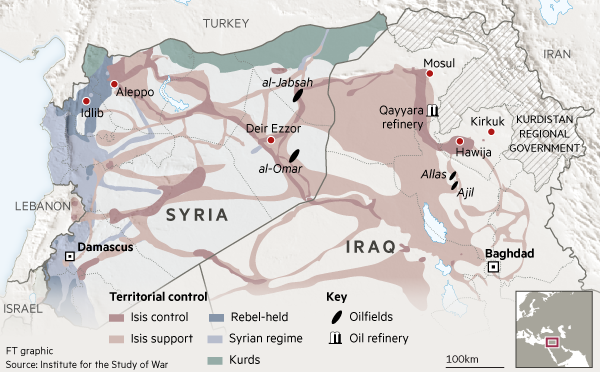October 27, 2015 10:33 pm
The Pentagon was also likely to conduct more raids against Isis positions in Syria and was looking again at the idea of placing some US forces closer to the front lines of fighting against Isis, particularly in Iraq.
“We won’t hold back from . . . conducting missions directly, whether by strikes from the air or direct action on the ground,” secretary of defence Ashton Carter told a Senate hearing.
Even as it prepares new military plans for Syria, US officials said on Tuesday that Iran had been invited to talks about the future of Syria that would also include Russia — in what amounts to an important shift in the US approach to diplomacy over the Syrian conflict.
John Kirby, state department spokesman, said it was not clear yet if Iran would attend the talks, which will take place in Vienna on Friday and which will also include European and Arab governments.
In recent weeks, the US has made it clear that it would not oppose Iran’s involvement in international talks over Syria, however the idea has been strongly opposed by some US allies, including Saudi Arabia.
The Obama administration is being pressed to expand its military campaign against Isis, especially in Syria, following the intervention of Russia directly in the conflict and the failure of its own programme to train moderate rebels to take on the Assad regime.
US officials also acknowledge that Isis continues to generate substantial revenue from selling oil, frustrating efforts by the US-led international coalition to hamper the group’s financial foundations.

When the US campaign against Isis began in Syria just over a year ago, many of the initial air strikes focused on oil infrastructure operated by Isis and at the time US officials expressed optimism that the group’s oil revenues had been substantially reduced.
However, a senior administration official acknowledged that even after the initial air strikes, Isis was still making $500m a year from its oil operations. “They are generating an awful lot of money internally,” the official said. “Oil is still a very lucrative business for them.”
US military officials said last week that air strikes had attacked Isis operations in the al-Omar oilfield in eastern Syria, which is at the heart of the oil enterprise operated by the group.
“We must be more aggressive in strikes that will deny Isis the access they have to oil revenue,” Gen Dunford said on Tuesday.
Mr Carter said the attacks on oilfields would be part of an intensified air campaign against Isis in Syria that would include strikes against the group’s senior members. The US would also increase support to rebel groups that are in a position to put pressure on Raqqa, Isis’ self-declared capital in Syria.
“If done in concert as we intend, all these actions on the ground and from the air should help shrink [Isis] territory into a smaller and smaller area,” he said. However, Mr Carter said the Pentagon was not proposing the establishment of no-fly or safe zones within Syria.
Gen Dunford said he might recommend that US forces operate beside Iraqi troops on the front line in certain circumstances, but that no such decision had yet been taken. Over the past year, the Pentagon has said that efforts by the Iraqi military to retake cities from Isis, such as Ramadi or Mosul, would require a more direct participation of US forces in the country.
